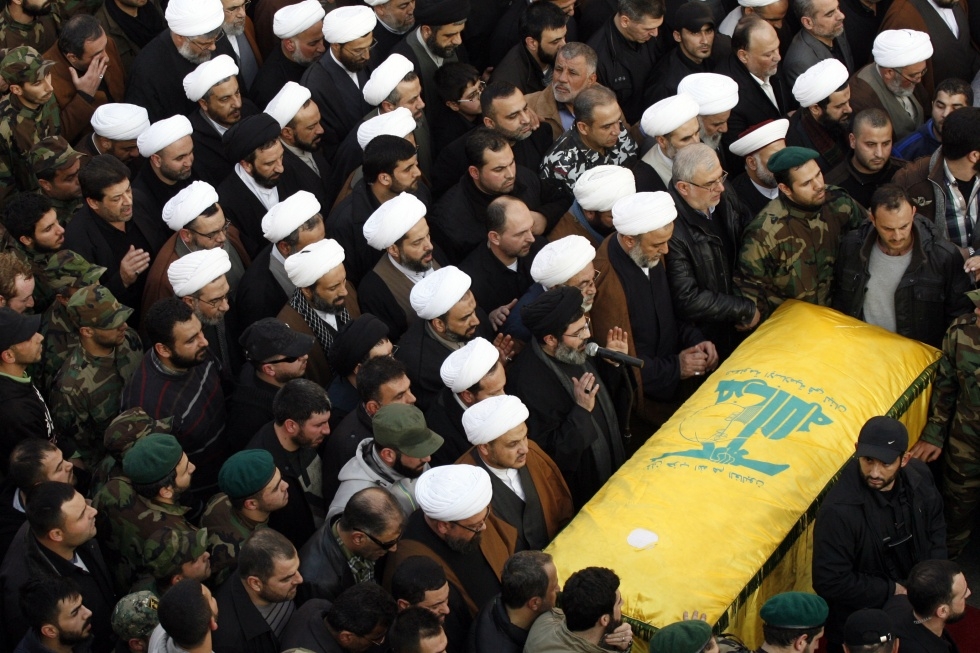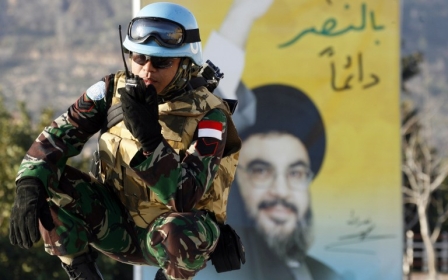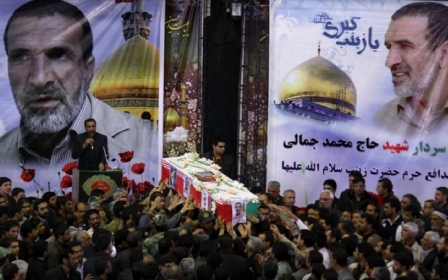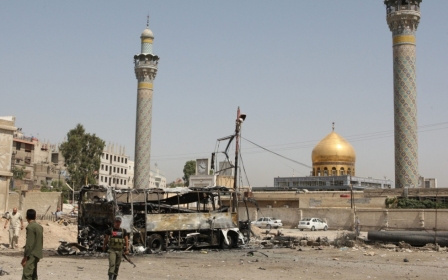Lebanon’s Hezbollah under pressure on all fronts

The targeted killing by Israel of six Hezbollah fighters, in addition to an Iranian general, in Quneitra - close to the Israeli-occupied Golan Heights on Sunday - is a significant blow to the Lebanese Shiite movement. The symbolism of the damage was underscored by the death of Jihad Mughniyah, the son of the legendary Imad Mughniyah, who was assassinated by Israel in 2008.
The strike is even more painful to bear for Hezbollah as it came in the wake of an admission by the movement that one of its overseas operatives had been spying for the Israeli intelligence service Mossad.
These setbacks point to a concerted Israeli campaign to exploit the chaos of the proxy war in Syria to inflict maximum damage on its deadliest enemy. Since 2012, Israel has repeatedly struck Hezbollah-related targets in Syria with impunity with the safe assumption that its enemies in the so-called “resistance axis” cannot strike back due to their commitments in the Syria War.
The spy scandal which unmasked unit 901 operative Muhammad Shawraba as a Mossad agent will complicate Hezbollah’s plans to retaliate against repeated Israeli provocations in Syria. At the very least the scandal will raise alarm bells in Tehran and may curtail Iranian support to Hezbollah in critical areas such as intelligence sharing and training.
Unique intelligence service
Lebanon’s Hezbollah movement has achieved spectacular success in the past three decades in Lebanon and the wider region on account of the unique quality of its work in many domains, ranging from the provision of social services in its Shiite heartland to organising the most impressive non-state armed forces in the world.
The least well known of Hezbollah’s extraordinary achievements is naturally its overseas intelligence service spearheaded by an elite group known as unit 901. This unit sits at the apex of a wider intelligence service that is active in all four corners of the globe, from Australia to South America.
Whilst unit 901 is primarily tasked with conducting reconnaissance with a view to supporting kinetic operations against Israeli targets, much of the work of Hezbollah’s wider overseas intelligence service is mundane and revolves around the collection of intelligence designed to buttress the movement’s political and financial position inside Lebanon and the wider region.
Hezbollah’s overseas intelligence service taps into the talents, wealth and connections of the established Lebanese diaspora across the world, particularly in Australia, West Africa and South America. Many successful Lebanese or people of Lebanese origin - even those who are ostensibly opposed to Hezbollah - have wittingly or unwittingly come into contact with Hezbollah intelligence.
The extent of this intelligence network, and the vast amounts of political, economic and social information which it hoovers up, makes Hezbollah’s intelligence organisation the most outstanding non-state service in the world. Moreover, similar to Hezbollah’s armed forces, the movement’s overseas intelligence service is superior in both scope and quality to many avowed state services.
Ultimately the real value of Hezbollah’s overseas intelligence service is that it enhances the movement’s prestige and indispensability in the eyes of its Iranian masters. This is as much operational as it is political, for whilst the Islamic Republic wields the best intelligence system in the region, for a variety of political, cultural and operational reasons, Iranian intelligence cannot operate effectively outside the Middle East.
In assessing the extent of the actual and potential damage of Shawraba’s treachery it is important to consider the following qualifying factors. Hezbollah Secretary-General Hassan Nasrallah is probably right in downplaying the importance of Shwraba (particularly in light of sensationalist pro-Israeli reporting which cast Shawraba as the commander of unit 901).
Moreover, it is noteworthy that Shawraba is not the first spy to have penetrated the heart of Hezbollah’s operations. The movement has periodically discovered and punished operatives who had made contact with Western intelligence, most recently with the CIA in 2011. Furthermore, since 2009 Lebanese security agencies have arrested scores of alleged Israeli spies, most of them burrowed deep inside the sensitive telecommunications sector. Many of these alleged Israeli agents had been tasked to monitor Hezbollah targets.
Wither Hezbollah?
Mossad’s penetration of the heart of unit 901, if not overly damaging in operational terms, will undoubtedly sabotage the morale of Hezbollah operatives and supporters. Most important of all it will raise profound and difficult questions in Tehran, which may have repercussions for wider Iranian support to the Lebanese Shiite movement.
Hezbollah should be worried especially as the foreign policy team around Iranian president Hassan Rouhani is exclusively driven by Iranian national interest and they have little time for under-performing allies and proxies. Their influence is mitigated by the dense foreign policy establishment in Tehran, and luckily for Hezbollah ideological hardliners, still have the upper hand in the Syria and Lebanon portfolio.
As to the wider question of Hezbollah’s posture in Lebanon and Syria, it is far too premature to regard recent setbacks as a sign of a potential decline. The ferocity of the Syria War has swollen the ranks of Hezbollah and thus lowered recruitment standards.
Recent security breaches can be attributed to the pressures of the Syria War as Hezbollah is forced to ease its harsh security procedures, thus creating space for spies and saboteurs.
But regardless of how intense the pressure becomes, and how great the losses in Syria are whether at the hands of Sunni jihadists or Israel, Hezbollah can count on substantial Iranian support more or less indefinitely. This factor alone mitigates a wide range of actual or potential risks.
Finally, it is important to remember that Hezbollah is an innovative and resourceful movement. Whilst Israel has acted with impunity in repeatedly violating Syrian sovereignty over the past three years, the Israelis should not under-estimate Hezbollah’s capacity to strike back forcefully.
- Mahan Abedin is an analyst of Iranian politics. He is the director of the research group Dysart Consulting.
The views expressed in this article belong to the author and do not necessarily reflect the editorial policy of Middle East Eye.
Photo: Mourners pray over the casket of Hezbollah military leader Mohammed Issa, one of the six Hezbollah fighters killed in an Israeli strike near Quneitra (AFP)
New MEE newsletter: Jerusalem Dispatch
Sign up to get the latest insights and analysis on Israel-Palestine, alongside Turkey Unpacked and other MEE newsletters
Middle East Eye delivers independent and unrivalled coverage and analysis of the Middle East, North Africa and beyond. To learn more about republishing this content and the associated fees, please fill out this form. More about MEE can be found here.





